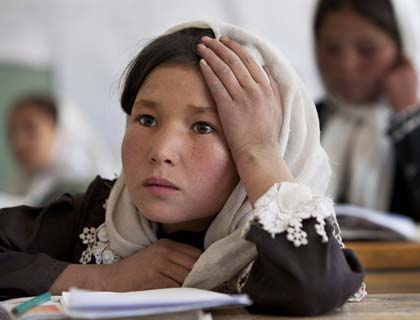There can be no denying the fact that Afghanistan's future will be in the hands of its children and the youthsof today. Bringing back normalcy to Afghanistan after more than three decades of conflict and violence and setting Afghanistan on the road to development and progress will be possible only when today's young men and women and school-age children are equipped with the weapons of knowledge and wisdom. Educating the youths of Afghanistan, therefore, is of paramount importance for an Afghanistan without able and knowledgeable youths would not find the way towards greater prosperity and development.
Everybody inside and outside the government calls loud out for the necessity of Afghanistan's economic development; for development to gradually wash away the material poverty of its people and to act as a strong bulwark against rise if Talibanism and militancy. Where and when there are economic opportunities for the people, very few would be willing to shatter the status quo and take up arms.
The question is that are the youths and children of today in Afghanistan adequately educated? Do they receive education and if they do, is the education they receive of acceptable quality? What a bout the university students of Afghanistan? Do the universities and centers of higher education in Afghanistan impart quality education to the masses of students? And whether the knowledge, skills and training they provide is relevant to today's job market of Afghanistan? If a young Afghan man decides to go through four tedious years of study in a university, would he get a commensurate compensation in terms of a secure job and gainful employment? There are questions that need to be asked, explored and addressed by the school and higher education authorities in Afghanistan.
Afghanistan's development requires a trained and skillful base of human resources who are able to carry out the duties and responsibilities of the new types of industries and service firms of a new economy. There is a two-way tradeoff between the education system and the development of the country. Without a large pool of rightly educated, trained and skilled human resource, there would be no development of the country and on the same token, there would be no incentive and willingness on the part of the educational sector to grow and improve without a developing economy that generates opportunities.
Let us take an example. Various Arab countries in the Middle East and the Persian Gulf region have for decades been dependent on work force from abroad in order to meet the human resources requirements of their growing economies. From Philippines and Indonesia to Pakistan and India, millions of workers have found gainful employment and tens of billions of dollars in remittances they send back home have come to form a significant part of their respective countries' national income.
Officials from these Arab countries have many times expressed their willingness to hire workers from Afghanistan to help Afghanistan tackle its unemployment and under-development challenges. The only factor that prevents Afghans from working in those countries is that Afghan workers are not trained and skilled in those professions required by the Middle Eastern countries. From hotel and hospitality to services and retail industry to oil and gas, opportunities abound but Afghan workers have practically no training and skills to work in these industries. This example clearly demonstrates Afghanistan's challenges of developing its human resource base.
Unfortunately, the majority of university graduates in Afghanistan, at more than 30,000 each year, are not able to find employment after finishing their higher education. For most of them, the employment they end up working in is vastly different than what they studies in university. A stagnant, highly under-developed economy coupled with the government sector's declining hiring means that for most of them the dream of a secure and comfortable white-collar job will remain unfulfilled. On the other hand, the training and the skills that the universities provide, with their outdated curriculum, is not on par with the demands of the small job market of Afghanistan. Most of those studying in humanities and social sciences end up looking for employment for long time.
In order to meet Afghanistan's challenges of underdevelopment and stagnant economy, universities and centers of higher education have a crucial role to play. It is the duty of the government and the higher education sector, whether public or private, to train and educate a new generation of Afghan youths who are equipped with the right set of skills to contribute to the development of Afghanistan. Perhaps, what we need is a sweeping review of the education sector in Afghanistan both at the school and university levels. With the introduction of many private institutions of higher education, it is hoped that the government sector universities would also find the impetus and incentive to review and revamp their workings. The introduction of private higher education institutes has had the advantage of breathing a new life into Afghanistan's higher education sector although these private institutions have their own many shortcomings.
Higher education in Afghanistan should move towards inculcating a spirit of entrepreneurship and creativity in young students. Merely filling their minds with volumes of lifeless, theoretical half-knowledge cannot help them help the country move out of the current state of morass and stalemate. For this purpose it is required that the higher education authorities in Afghanistan including the Ministry of Higher Education move the sector towards greater viability and relevance.
Our centers of higher learning need to become laboratories wherein the real-life problems and challenges of the society and economy are tackled and sought to be resolved. Breaking the vicious cycle and making the higher education sector in Afghanistan turn into an active agent of change from its current stalemate would be one of the biggest pushes to the development of the country and the society at large. We hope that the private-sector higher education institutions can carry out at least a part of this supreme duty and fulfill their responsibilities to the country and the nation.

